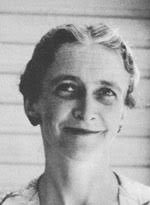I spent most of the day walking in sun and wind, enjoying the green and blue steeps of mountains, watching the Formosans
plant onions and handfuls of seeds on the small terraces they have made back of the hospital. The onions send up a strong springlike odor from their warm hands. On the opposite rocky hill with a backdrop of radiant gradations of blue, I watched the Igorot woman make holes with a pointed hatchet wherein she planted camote vine. The husband, son and daughter younger than June and Bedie have hacked and dug and prepared the ground for days, working from the road right up the steep slope where black earth nestles in rocky cradles. Now it is beautiful—row after row of plants evenly set up to the point, then curving beyond and out of sight. They have worked hard, with bent backs and heaving arms, strained muscles. It is something to look at, already a reward, as is camp garden opposite. Ours is not so patiently dug, I am afraid. Jo has been an admirable garden leader, with monumental patience and effort accomplishing much with recaIcitrant mortals and slow carabao, not to mention pricking and prodding commands constantly interfering. But the garden is there, growing. with a few actually enjoying the making of it.
Jerry came down at six about sunk after a day of starvation. They had camotes which were only half cooked for lunch, green beans which are not bulk enough. For supper, after all day on nothing, they had no camotes, only a little meat gravy, cabbages and soft rice because so many took hard rice that there was not enough to go round. Soft rice does not stay by one. Jerry could not keep his eyes open, his head up, or his speech and thoughts connected. He brought the American Woman’s Cookbook but I could not bear to look at the colored pictures of roast chicken and fruit salad. I feel like clawing the air for fruit. It is two months since we had any. | felt bad about Jerry and worried over his condition long afterward.
